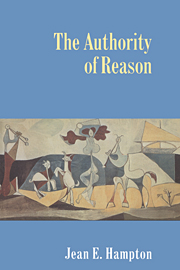Book contents
- Frontmatter
- Contents
- Editor's Preface
- Preface and Acknowledgments
- Introduction
- PART I SCIENCE AND OBJECTIVE NORMS
- PART II INSTRUMENTAL REASON
- 4 Instrumental Reasons
- 5 Why Instrumental Reasoning Isn't Instrumental
- 6 Instrumental Reasoning and the Methodology of Science
- PART III REASONS AND REASONING
- Bibliography
- Index
5 - Why Instrumental Reasoning Isn't Instrumental
Published online by Cambridge University Press: 02 December 2009
- Frontmatter
- Contents
- Editor's Preface
- Preface and Acknowledgments
- Introduction
- PART I SCIENCE AND OBJECTIVE NORMS
- PART II INSTRUMENTAL REASON
- 4 Instrumental Reasons
- 5 Why Instrumental Reasoning Isn't Instrumental
- 6 Instrumental Reasoning and the Methodology of Science
- PART III REASONS AND REASONING
- Bibliography
- Index
Summary
In Chapter 4, I aimed to show that instrumental rationality, as we standardly conceive of it, is informed by a notion of normativity that includes the idea of objective authority – just the idea that moral skeptics have claimed objective moral theories include, such that they are not acceptable from a naturalist point of view. The aim of that chapter was to begin the “companions in guilt” strategy for defending objectivist moral theory. That strategy is meant to disarm morality's skeptical critics, for if these skeptics presuppose in their conception of rationality the same occult element that they criticize in objectivist moral theories, then their criticisms indirectly defeat their own position.
This chapter continues the “companions in guilt” strategy by examining in more detail the nature of instrumental reasoning. Most theorists have taken it for granted that defining the nature of instrumental reason does not in any way involve developing a conception of the good, because figuring out the nature of instrumental reason is quite separate from the task of figuring out what the good is. This point of view is particularly critical for what I will call the “instrumentalists,” who believe that the only role that reason plays in practical deliberation is an instrumental role.
- Type
- Chapter
- Information
- The Authority of Reason , pp. 167 - 206Publisher: Cambridge University PressPrint publication year: 1998



